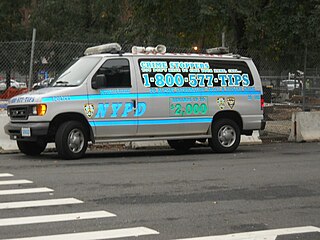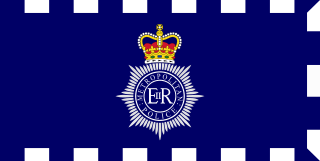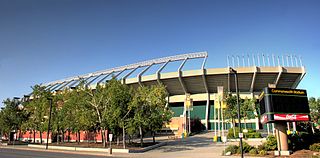Related Research Articles

The broken windows theory is a criminological theory that states that visible signs of crime, anti-social behavior, and civil disorder create an urban environment that encourages further crime and disorder, including serious crimes. The theory suggests that policing methods that target minor crimes, such as vandalism, loitering, public drinking, jaywalking and fare evasion, help to create an atmosphere of order and lawfulness.

Closed-circuit television (CCTV), also known as video surveillance, is the use of video cameras to transmit a signal to a specific place, on a limited set of monitors. It differs from broadcast television in that the signal is not openly transmitted, though it may employ point-to-point (P2P), point-to-multipoint (P2MP), or mesh wired or wireless links. Even though almost all video cameras fit this definition, the term is most often applied to those used for surveillance in areas that require additional security or ongoing monitoring.

Wealdstone is a district located in the centre of the London Borough of Harrow, England. It is located just north of Harrow town centre and is south of Harrow Weald, west of Belmont and Kenton, and east of Headstone. The area accommodates most of Harrow's industrial and business designated land. As the blue-collar part of the borough, Wealdstone is perhaps best known for the Kodak Harrow plant, which closed down in 2016. Wealdstone is centred on the High Street, and much traffic is bypassed from here by the George Gange Way flyover built in 1996. Its western boundary is formed by Harrow View, across which Headstone Manor lies, whereas on the east is Byron Park and the Belmont Trail. Harrow & Wealdstone station and the council offices are located at its southern end.
A police community support officer, or as written in legislation community support officer is a uniformed member of police staff in England and Wales, a role created by Section 38(2) of the Police Reform Act 2002, which was given Royal Assent by Queen Elizabeth II on 24 July 2002. They are non-warranted but provided with a variety of police powers and the power of a Constable in various instances by the forty-three territorial police forces in England and Wales and the British Transport Police.
The Australian High Tech Crime Centre (AHTCC) are hosted by the Australian Federal Police (AFP) at their headquarters in Canberra. Under the auspices of the AFP, the AHTCC is party to the formal Joint Operating Arrangement established between the AFP, the Australian Security Intelligence Organisation and the Computer Network Vulnerability Team of the Australian Signals Directorate.

Crime Stoppers or Crimestoppers is a community program that helps people to provide anonymous information about criminal activity. Often managed by non-profit groups or the police, it operates separately from the emergency telephone number system or other standard methods of contacting police. This allows a person to provide crime-solving assistance to the authorities without being directly involved in the investigation process. Founded in the United States in 1976 in Albuquerque, New Mexico, Crime Stoppers later caught on in Canada and the United Kingdom.
Public intoxication, also known as "drunk and disorderly" and drunk in public, is a summary offense in some countries rated to public cases or displays of drunkenness. Public intoxication laws vary widely by jurisdiction, but usually require an obvious display of intoxicated incompetence or behavior which disrupts public order before the charge is levied.

Gwent Police is a territorial police force in Wales, responsible for policing the local authority areas of Blaenau Gwent, Caerphilly, Monmouthshire, Newport and Torfaen.

Gloucestershire Constabulary is the territorial police force responsible for policing the non-metropolitan county of Gloucestershire in England.

Sussex Police is the territorial police force responsible for policing the counties of East Sussex and West Sussex. The force is headquartered in Malling House, Lewes, East Sussex.

The Metropolitan Special Constabulary (MSC) is the volunteer police force of the Metropolitan Police Service. It is one of three Special Constabularies operating within London, the others being part of the City of London Police and British Transport Police. The service was created over 180 years ago under the Special Constables Act 1831, and currently consists of 1,731 officers, making it the largest in the UK.
Neighbourhood Watch in the United Kingdom is the largest voluntary crime prevention movement covering England and Wales with upwards of 2.3 million household members. The charity brings neighbors together to create strong, friendly and active communities in which crime can be tackled. Neighbourhood Watch Network is the umbrella organization supported by the Home Office to support Neighbourhood Watch groups and individuals across England and Wales.
The fear of crime refers to the fear of being a victim of crime as opposed to the actual probability of being a victim of crime. The fear of crime, along with fear of the streets and the fear of youth, is said to have been in Western culture for "time immemorial". While fear of crime can be differentiated into public feelings, thoughts and behaviors about the personal risk of criminal victimization, distinctions can also be made between the tendency to see situations as fearful, the actual experience while in those situations, and broader expressions about the cultural and social significance of crime and symbols of crime in people's neighborhoods and in their daily, symbolic lives.
Crime prevention is the attempt to reduce and deter crime and criminals. It is applied specifically to efforts made by governments to reduce crime, enforce the law, and maintain criminal justice.

McCauley is a vibrant and ethnically diverse inner city neighbourhood in Edmonton, Alberta undergoing revitalization. It is named for Matthew McCauley, the first mayor of Edmonton, and is located just to the north east of the Downtown core. McCauley is famous as the home of dozens of religious buildings concentrated in a small area as well as being a large venue for the 1978 Commonwealth Games.

The Policing and Crime Act 2009 is an Act of the Parliament of the United Kingdom. The Act makes provision about police reform, prostitution, sex offenders, sex establishments and certain other premises. It amends the law on aviation security, misuse, proceeds of crime, extradition and gang related violence.
Proactive policing is the practice of deterring criminal activity by showing police presence. It includes activities such as the use of police powers by both uniformed and plain-clothes officers, engaging the public to learn their concerns, and investigating and discovering offences and conspiracies to commit crimes so that the crimes cannot be committed. In contrast, responding to a complaint after a crime has been committed is reactive policing.

Redeeming Our Communities (ROC) is a UK-based charity, founded by author and popular speaker Debra Green OBE in 2004.

Project Servator police deployments were originally introduced by the City of London Police in February 2014 as "New policing tactics to deter and detect criminal and terrorist activity, as well as to reassure the general public. " Project Servator has since been adopted by British Transport Police, Police Scotland, Essex Police, Ministry of Defence Police the Civil Nuclear Constabulary and the Metropolitan Police. The police have used Project Servator tactics in London, on the national rail network and at the 2014 Commonwealth Games in Glasgow, V Festival and shopping centres.
References
- ↑ Innes and Fielding (2002), abstract – http://www.socresonline.org.uk/7/2/innes.html
- ↑ Tuffin et al (2006), p2–3 – https://www.gov.uk/government/uploads/system/uploads/attachment_data/file/115825/hors296.pdf
- ↑ Innes and Fielding (2002), para 5.2 – http://www.socresonline.org.uk/7/2/innes.html
- ↑ For example, see Cran et al (2012) – http://www.sipr.ac.uk/downloads/I-NSI_2012.pdf
- Neighbourhood Policing
- "Crime as a Signal, Crime as a Memory" –article by Martin Innes for Journal for Crime, Conflict and the Media (PDF)